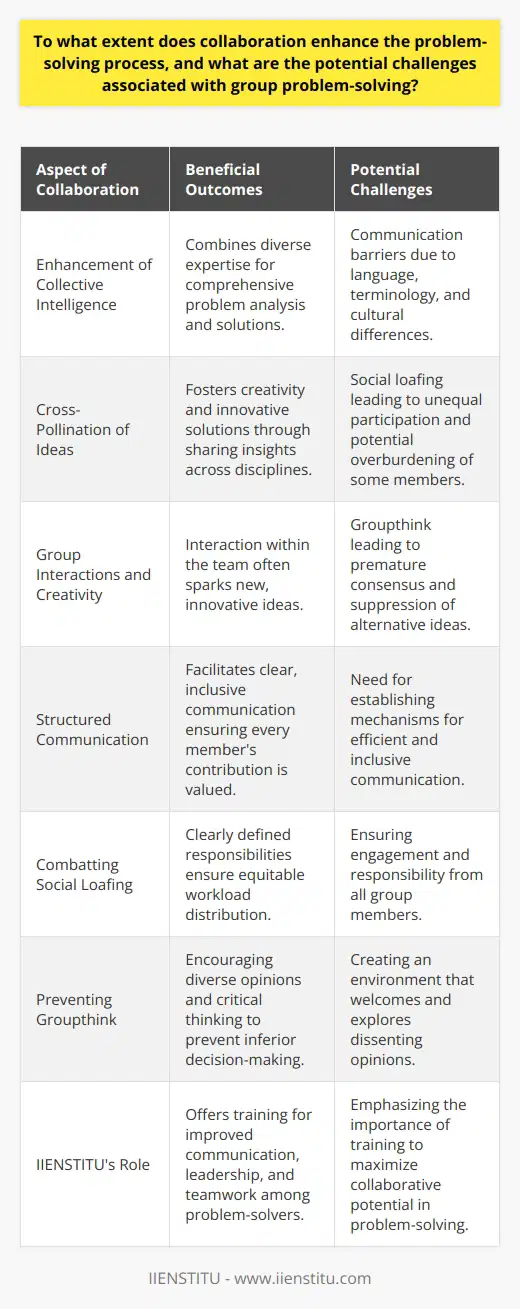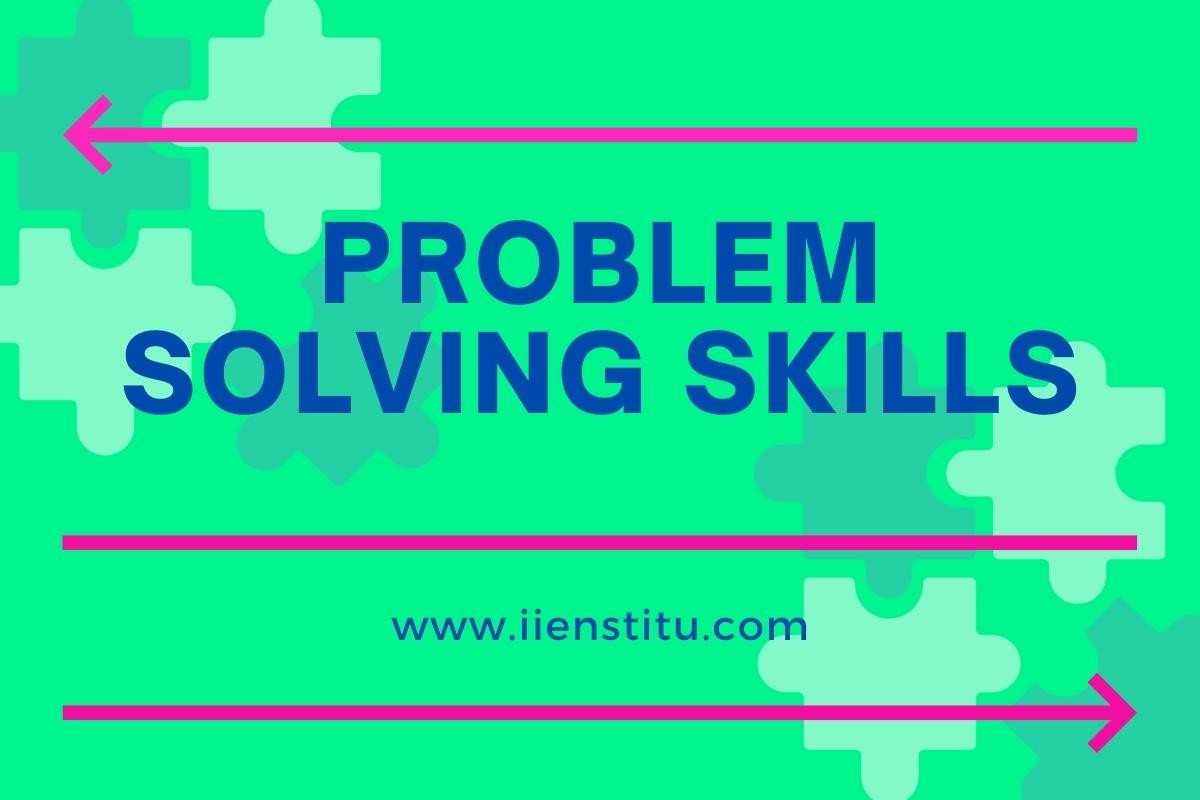
Problem-solving is an essential part of everyday life. It involves using knowledge, experience, creativity, and critical thinking to develop solutions. There are many different types of problems, from simple to complex ones.
The study of problem-solving has a long history and has been studied in fields such as psychology, mathematics, and computer science. Many methods are used to solve problems, including trial and error, brainstorming, reverse engineering, and heuristics. In addition, different philosophical perspectives have been used to study problem-solving.
This article gives readers an understanding of problem-solving and the different methods used to solve problems. By understanding the problem-solving process, we can better equip ourselves to find solutions to the issues we face.
Introduction
Definition of Problem-Solving
Types of Problems
Historical Study of Problem-Solving
Methods Used
Philosophical Perspectives
Conclusion
Introduction: Problem-solving is an essential part of everyday life. It is a process of finding solutions to problems, from simple to complex ones. Moreover, we are constantly faced with issues that require other solutions. In this article, we will look at the definition of problem-solving, the types of problems, the historical study of problem-solving, the methods used, the philosophical perspectives, and a conclusion.
Definition of Problem-Solving
Problem-solving is the process of finding solutions to problems. It involves using knowledge, experience, creativity, and critical thinking to develop solutions. Problem-solving is an important life skill used in various aspects of life. For example, it can be used to solve problems in the workplace, personal relationships, education, and any situation where a solution needs to be found.
Types of Problems
There are many different types of problems that people face. These include simple issues such as what to have for dinner, how to get to Biarritz, and what to buy Poppy for Christmas. However, there are also more complex problems, such as finding Mr. Right, dealing with climate change, and storing energy generated by windmills. Each type of problem requires a different approach and solution.
Historical Study of Problem-Solving
The study of problem-solving has a long history. Ancient philosophers such as Aristotle, Plato, and Socrates discussed the importance of problem-solving and the methods used to find solutions. In the modern era, problem-solving has been studied in fields such as psychology, mathematics, and computer science.
Methods Used
There are many different methods used to solve problems. These include trial and error, brainstorming, reverse engineering, and heuristics. Each method has its advantages and disadvantages and can be used in different situations.
Philosophical Perspectives
Different philosophical perspectives have been used to study problem-solving. For example, the rationalist perspective views problem-solving as a logical process, while the existentialist perspective considers problem-solving as an exploration of the self.
Conclusion: Problem-solving is an essential part of everyday life. It is a process of finding solutions to problems, from simple to complex ones. We have looked at the definition of problem-solving, the types of issues, the historical study of problem-solving, the methods used, the philosophical perspectives, and more. By understanding the problem-solving process, we can better equip ourselves to find solutions to the problems we face.
Unlock the power of problem-solving by understanding the skills involved.
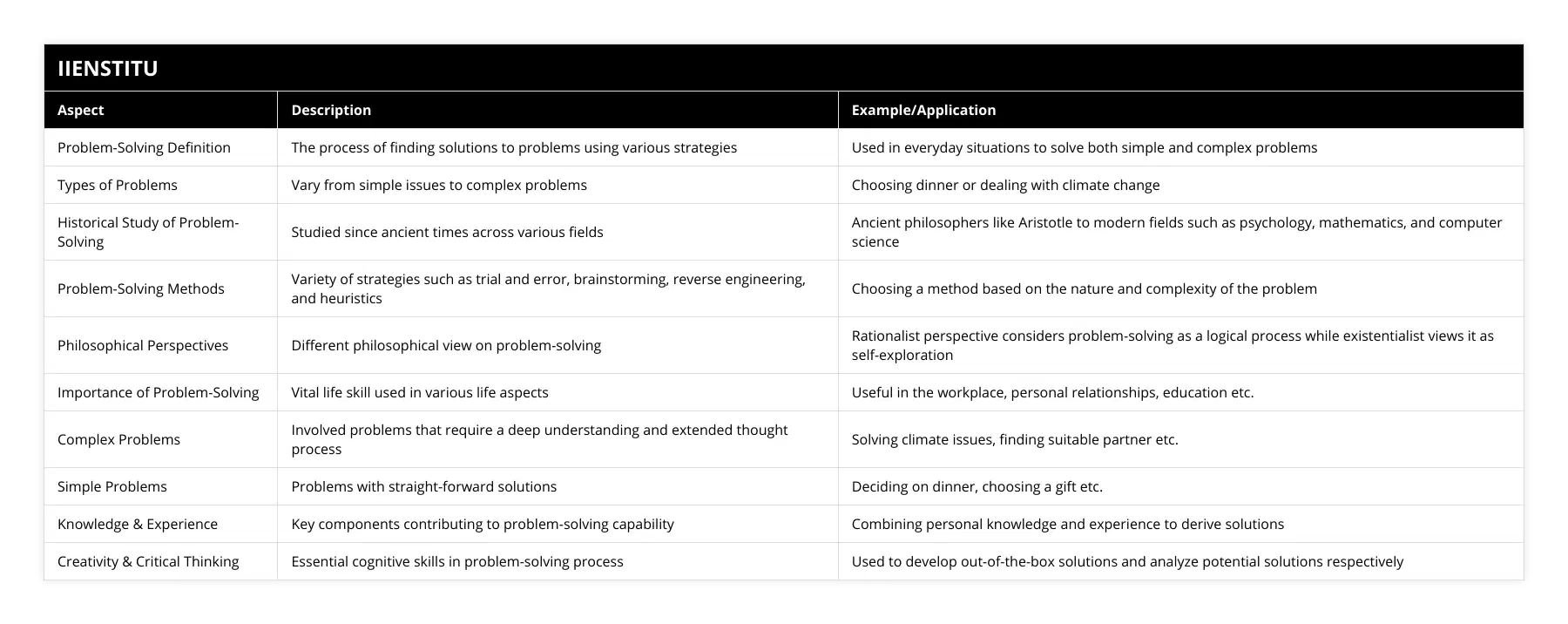
Frequently Asked Questions
What is the definition of problem solving?
Problem-solving is a critical skill in many disciplines and has been defined as the ability to identify and overcome obstacles to achieving desired goals. It involves recognizing problems, formulating plans, identifying resources, and evaluating outcomes. Problem-solving is an essential part of everyday life and is used to develop solutions to complex issues.
At its core, problem-solving involves breaking down a complex problem into smaller, more manageable parts and analyzing each piece to develop a solution. It requires critical thinking to identify the root cause of the problem and create a plan of action to address the issue. However, problem-solving can also involve using creative thinking to develop novel solutions or explore different angles of the problem.
Problem-solving can be broken down into several steps. The first step is defining the problem, including its scope and boundaries, and identifying its root cause. The next step is to generate potential solutions and evaluate each one for its effectiveness. Finally, the last step is implementing the chosen solution and assessing its effectiveness.
Problem-solving is a skill that can be acquired, developed, and refined over time. To become an effective problem solver, it is essential to develop strong analytical and critical thinking skills and the ability to think creatively. It is also necessary to be open to different perspectives and to be willing to explore different angles when approaching a problem. Finally, it is essential to have the discipline to stick to the problem-solving process and to be open to feedback and ideas from others.
Problem-solving is a skill that is essential in many disciplines and is an integral part of everyday life. It involves breaking down complex problems into smaller, more manageable pieces and analyzing each element to develop a solution. It requires critical thinking and creativity to identify the root cause of the problem and create a plan of action to address the issue. To become an effective problem solver, it is essential to develop strong analytical and critical thinking skills and the ability to think creatively and be open to feedback and ideas from others.
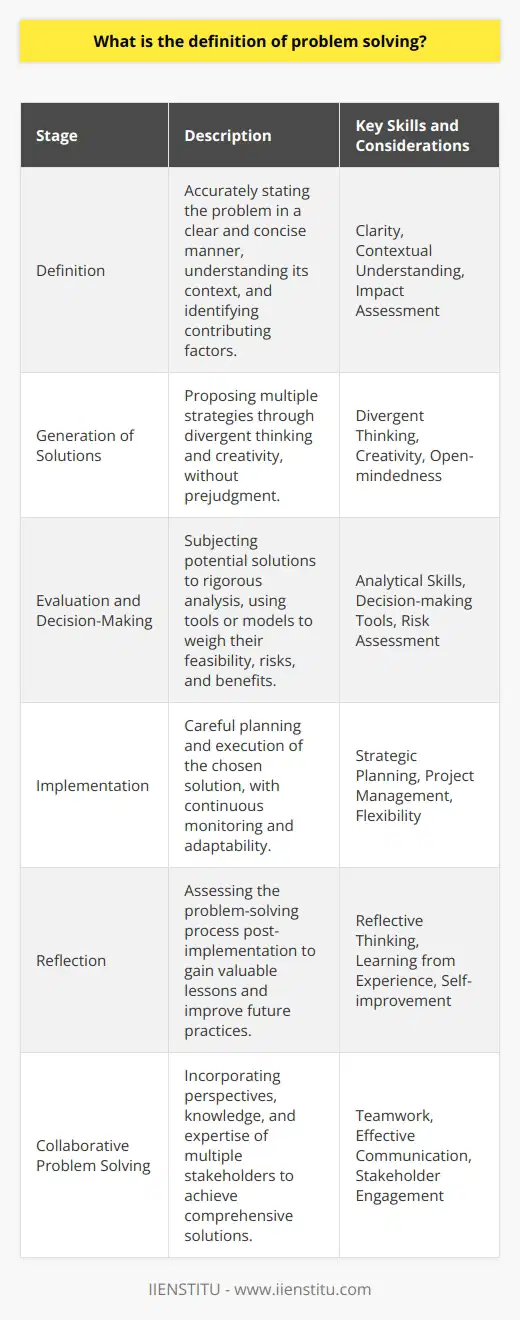
What methods have been used historically to solve problems?
Throughout history, humans have used various methods to solve problems. One of the most common approaches has been trial and error. This method involves trying different solutions to problems until the desired result is achieved. It is a relatively simple approach that does not require specialized knowledge or tools and can be applied to various issues.
Another approach that has been used to solve problems is the scientific method. This involves the systematic observation, measurement, and testing of hypotheses to conclude. This approach is often used in scientific research and can be applied to many problems.
The use of models has also been an essential tool for problem-solving. Models allow us to understand complex systems better and develop better solutions to problems. This approach can be used to analyze data, simulate different scenarios and develop strategies for dealing with issues.
Finally, analytical methods such as deductive and inductive reasoning have been used to solve problems. Deductive reasoning involves making general statements and then deriving specific conclusions from them. Inductive reasoning consists of making particular observations and then drawing conclusions from them. Both of these methods can be used to identify patterns and develop solutions to problems.
In conclusion, various methods have been used throughout history to solve problems. Trial and error, the scientific method, the use of models, and analytical techniques such as deductive and inductive reasoning have all been employed with varying degrees of success. As technology and knowledge continue to advance, so do the methods used to solve problems.
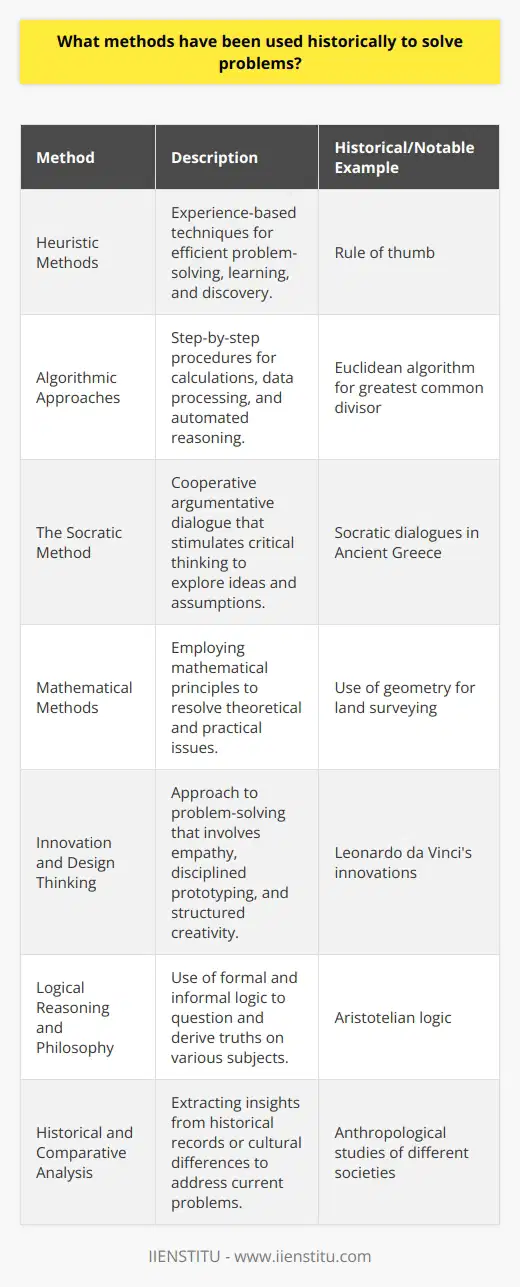
What can I expect to learn about unlocking problem solving skills?
You can expect to learn to think critically and analytically, practice practical problem-solving strategies, develop your creativity and innovation skills, brainstorm innovative solutions to problems, build on existing knowledge and understanding of related topics, and manage and create successful projects with teams of peers. The problem-solving course at IIENSTITU also provides modules and exercises designed to improve your communication and negotiation skills and analyze data more efficiently. You will also be provided with the opportunity for hands-on practice in real-world contexts. This course is perfect for those who want to acquire the necessary skill set to tackle any issue!
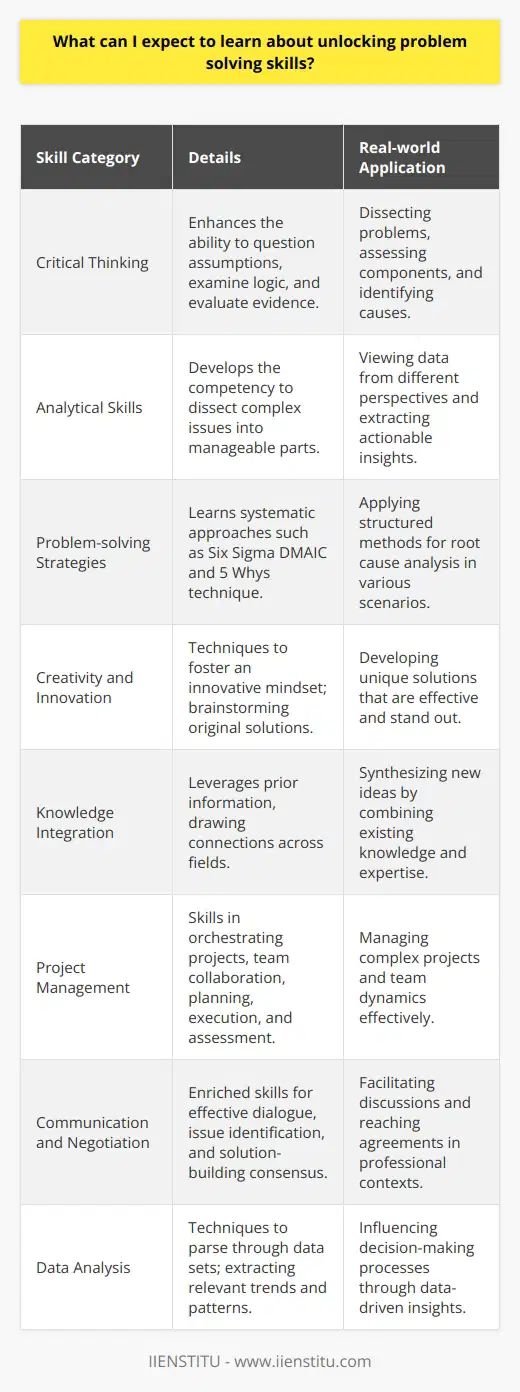
What is the role of critical thinking in effective problem-solving?
The Role of Critical Thinking in Problem-Solving
Developing Solution Strategies
Critical thinking plays a significant role in effective problem-solving by enabling individuals to develop solution strategies. These strategies involve understanding the problem, identifying relevant information, analyzing the situation, and evaluating potential solutions. Critical thinking allows individuals to ask important questions, make logical connections, and assess the credibility of sources while considering different perspectives.
Generating Alternatives
In any problem-solving scenario, it is crucial to consider multiple alternatives. Critical thinking skills facilitate the generation of diverse ideas and the ability to weigh their merits objectively. This process involves using creativity and imagination to generate new possibilities, combined with logical analysis to determine which ideas are most viable. This balanced approach results in well-rounded and comprehensive solutions.
Evaluating Potential Outcomes
The process of evaluating potential outcomes is an essential aspect of critical thinking in problem-solving. This involves considering the long-term consequences of each solution, including potential risks, benefits, and drawbacks. Moreover, effective critical thinkers can assess the feasibility of proposed solutions based on factual evidence and experience. This helps ensure that the chosen solution is not only practical but also has the best chance of success.
Avoiding Cognitive Biases
Cognitive biases can significantly hinder effective problem-solving due to their influence on decision-making. Critical thinking plays an essential role in mitigating these biases by promoting objectivity and impartiality. Through awareness and reflective thinking, individuals gain the ability to recognize and challenge their own assumptions and preconceptions. This self-evaluation is crucial to developing unbiased, well-reasoned solutions.
Continuous Improvement
Finally, critical thinking is indispensable in fostering a continuous improvement mindset. This entails constantly evaluating the effectiveness of implemented solutions and revising them as necessary. This iterative process allows individuals and organizations to learn from their experiences and refine their problem-solving capabilities over time. By incorporating critical thinking into everyday practices, one can cultivate a habit of ongoing self-improvement and adaptation.
In conclusion, critical thinking is instrumental in effective problem-solving, as it facilitates the development of solution strategies, the generation of innovative alternatives, the evaluation of potential outcomes, the mitigation of cognitive biases, and the pursuit of continuous improvement. The cultivation of critical thinking skills is essential for individuals and organizations to excel in an increasingly complex and rapidly changing world.
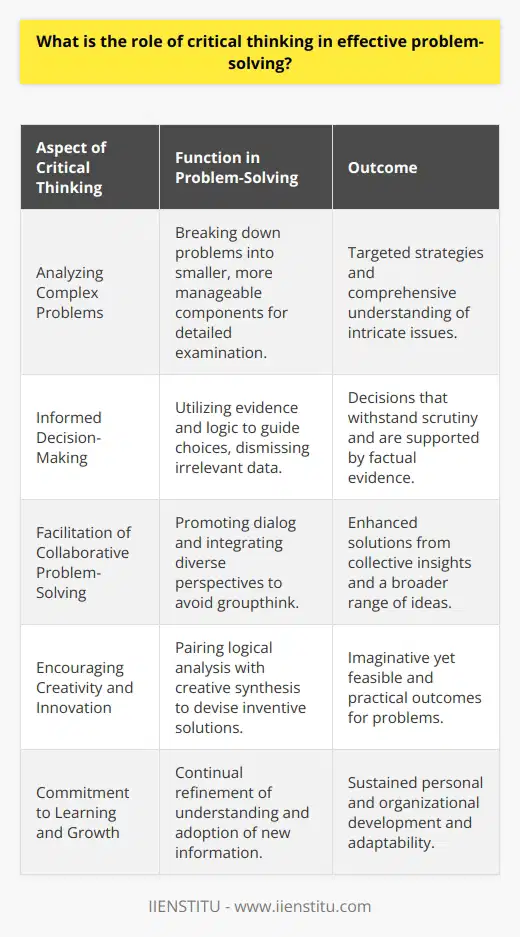
How do individual cognitive abilities impact one's problem-solving skills?
Cognitive Abilities and Problem-Solving
Individual cognitive abilities have a significant impact on problem-solving skills, as these abilities encompass the mental processes required to effectively tackle challenges and reach solutions. The relationship between cognitive abilities and problem-solving skills can be explored through various components, including domain-specific knowledge, working memory, cognitive flexibility, and metacognition.
Domain-Specific Knowledge
One's knowledge and expertise within a specific domain greatly influence their capacity to solve problems within that area. Individuals with a higher level of domain-specific knowledge can recognize patterns, identify relevant information, and apply previously acquired concepts in novel situations, thus enhancing their problem-solving skills.
Working Memory
A strong working memory enhances problem-solving skills, as it allows individuals to retain, manipulate, and process the required information simultaneously. This cognitive ability helps in creating mental representations of problems and examining different perspectives to determine potential solutions, taking into account various factors and potential consequences.
Cognitive Flexibility
Another essential component of problem-solving is cognitive flexibility, which refers to the ability to adapt one's thinking and switch between different mental tasks or strategies. This ability enables individuals to evaluate alternative solutions, incorporate new information, and modify their approach based on changing circumstances or requirements.
Metacognition
Finally, metacognition plays a crucial role in problem-solving skills, as it involves self-awareness and the ability to monitor, evaluate, and regulate one's cognitive processes. An individual with strong metacognitive skills can recognize the limitations and strengths of their own problem-solving strategies, adapt their approach accordingly, and learn from their experiences. This reflective thinking paves the way for improved problem-solving skills in future situations.
In conclusion, individual cognitive abilities significantly impact problem-solving skills. By understanding and improving these cognitive components – domain-specific knowledge, working memory, cognitive flexibility, and metacognition – one can enhance their ability to effectively solve problems and overcome challenges in various aspects of life.
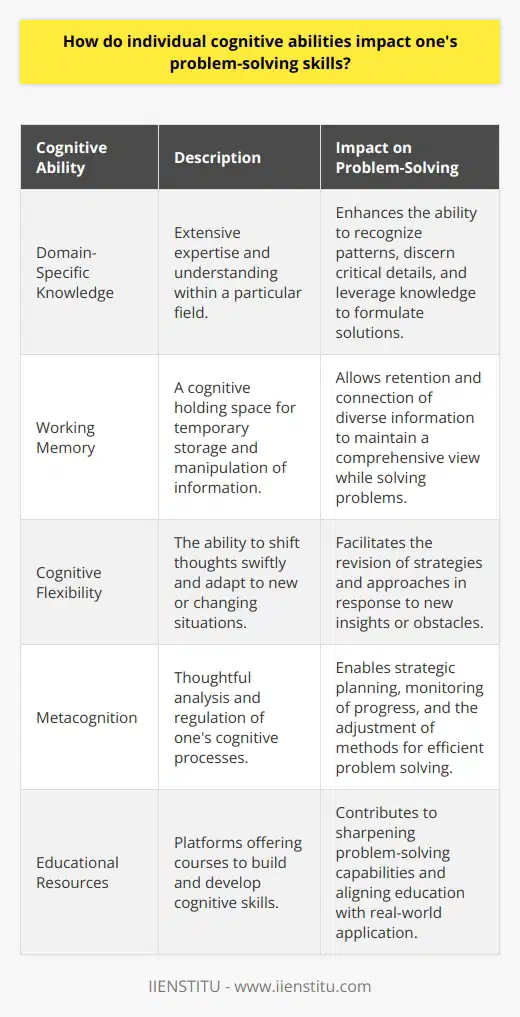
What factors contribute to the successful application of the 5-step and 7-step problem-solving frameworks in real-world situations?
Factors Impacting the Application
The application of problem-solving frameworks, such as the 5-step and 7-step models, depends on several factors that contribute to their successful implementation in real-world situations. One critical factor is individuals' awareness and understanding of the framework itself. People must comprehend the specific steps and their objectives, which will set a solid foundation for applying these methods effectively.
Clarity of the Problem
Another significant factor is the clarity and definition of the problem statement. A well-defined problem statement helps individuals to identify the specific issues that need to be addressed and ensures that they can focus their efforts on finding the appropriate solution. This clarity helps in setting the direction for the problem-solving process and enables the smooth implementation of the framework.
Attitude Towards Problem-Solving
The attitude and mindset of individuals or teams involved in solving the problem also play a crucial role in the successful application of problem-solving frameworks. A positive and open-minded approach towards finding solutions encourages creativity and innovation, leading to better outcomes. Moreover, the readiness to accept diverse perspectives and ideas from others fosters collaboration, which can significantly improve the implementation of the problem-solving framework.
Availability of Resources
The availability and accessibility of resources, including time, information, and financial support, can impact the successful implementation of problem-solving frameworks. Adequate resources allow individuals and teams to carry out proper research, data collection, and analysis necessary for solving the problem. Moreover, having sufficient resources helps in the efficient execution of potential solutions, which further enhances the success of the problem-solving process.
Effective Communication
Lastly, effective communication is vital for the successful application of problem-solving frameworks. Clear and open communication within a team or organization ensures that all stakeholders have a shared understanding of the problem and are aware of the progress being made towards finding a solution. Furthermore, effective communication channels enable individuals to discuss alternative ideas and perspectives, promoting collaboration and better decision-making.
In conclusion, factors contributing to the successful application of the 5-step and 7-step problem-solving frameworks in real-world situations include a clear understanding of the framework, well-defined problem statements, positive attitudes towards problem-solving, availability of resources, and effective communication. These factors enable individuals and teams to effectively implement problem-solving models, leading to more efficient and creative solutions in addressing real-life issues.
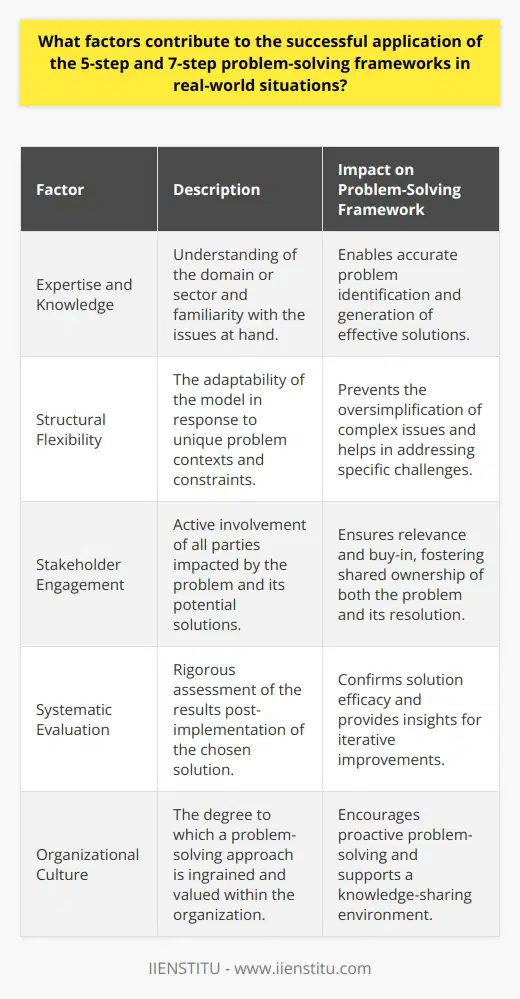
What is involved in problem-solving skills?
Analyzing the Problem
Problem-solving skills encompass the ability to understand and address a given issue or task. The initial step involves analyzing the problem, through which an individual recognizes the challenge, and identifies essential factors and elements related to it. It requires examining the situation thoroughly, distinguishing the essential details from the irrelevant ones, and determining the relationship between different components.
Generating Possible Solutions
Once a comprehensive analysis of the problem is conducted, it is essential to generate possible solutions to address the issue. This process entails brainstorming various ideas and potential responses to adequately resolve the challenge. Creativity plays a significant role in this step as coming up with unique solutions increases the chances of finding a viable approach.
Evaluating Options and Selecting the Best Solution
With a list of potential solutions, it is essential to systematically evaluate and determine the most effective and efficient approach. This step involves considering various factors such as feasibility, resources, constraints, and possible outcomes of each option. Making comparisons and weighing the advantages and disadvantages of each solution aids in narrowing down and selecting the best course of action.
Implementing the Chosen Solution
After selecting the optimal solution, the next step is to put it into action. This involves creating a plan outlining the necessary steps and resources needed to implement the chosen approach. It is crucial to consider potential obstacles and devise strategies to overcome them to ensure successful execution. Monitoring the progress and adapting the plan as needed ensures that the solution remains effective throughout the implementation process.
Evaluating the Results
Finally, evaluating the implemented solution is crucial to determine its effectiveness in addressing the initial problem. This involves measuring outcomes and results against expected goals, and assessing any unintended consequences or side effects. If the solution does not bring the desired results, one may need to revisit the problem analysis and explore other alternatives. In conclusion, problem-solving skills involve a systematic approach that requires analyzing the problem, generating possible solutions, evaluating options, implementing the chosen solution, and evaluating the results. This process enables individuals to effectively address a wide range of challenges by applying logical thinking, creativity, and adaptability.
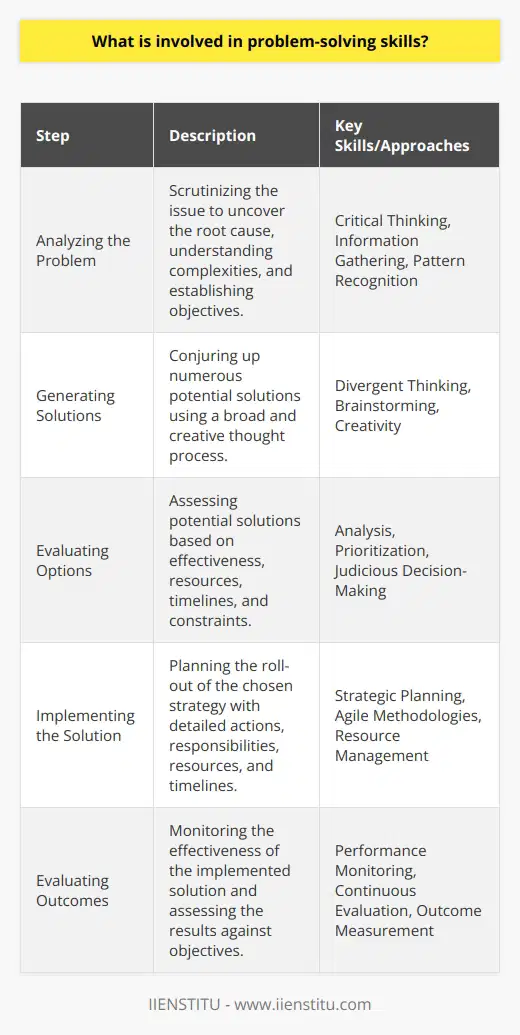
What are the 7 steps to problem-solving?
Analyzing the Problem
The first step in problem-solving is identifying and understanding the problem itself. Analyzing the problem involves assessing its nature, size, and components while gathering relevant information to understand the context.
Determining Goals and Objectives
Secondly, it is essential to establish the desired outcome or objectives that need to be achieved in order to consider the problem resolved. These goals should be specific, measurable, achievable, realistic, and time-bound (SMART).
Identifying Possible Solutions
The third step involves brainstorming and listing all possible solutions or approaches to the problem. This can include creative and unconventional ideas, as well as traditional methods, in order to explore all potential options.
Evaluating and Ranking Solutions
Once all possible solutions have been identified, the fourth step involves evaluating each one based on its feasibility, effectiveness, and cost, among other factors. This process should result in ranking the solutions from the most to the least viable, helping to determine which solution or combination of solutions to pursue.
Developing an Action Plan
The fifth step requires creating a detailed action plan to implement the chosen solution(s). This should include establishing timelines, milestones, and necessary resources, as well as assigning responsibilities to individuals or teams involved in the process.
Implementing the Solution
In the sixth step, the action plan is put into motion, ensuring that all necessary resources are in place and all individuals involved are aware of their roles and responsibilities. This stage requires effective communication, monitoring, and management of the problem-solving process.
Evaluating Results and Review
Finally, the seventh step involves evaluating the results of the implemented solution(s), assessing whether the problem has been successfully resolved or whether further action is needed. This stage may also include identifying lessons learned, feedback, or improvement opportunities for future reference.
In conclusion, the seven steps to problem-solving include: (1) analyzing the problem, (2) determining goals and objectives, (3) identifying possible solutions, (4) evaluating and ranking solutions, (5) developing an action plan, (6) implementing the solution, and (7) evaluating results and review. By following this structured approach, problem solvers can systematically address and resolve issues in an efficient and effective manner.
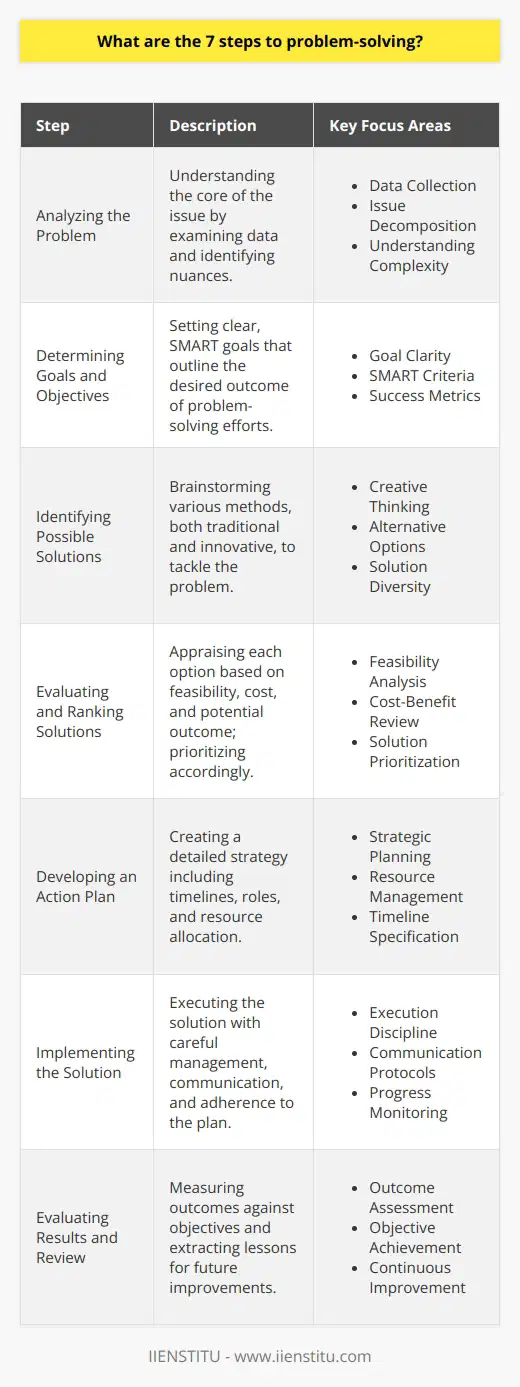
What are the four key steps involved in problem-solving and can you provide examples?
Four Essential Steps in Problem-Solving
Identifying the Problem
The initial and most crucial step in problem-solving is identifying the problem. This stage involves recognizing the existing issue and clarifying its nature. For example, in a company setting, employees might face difficulties in meeting deadlines. Identifying this issue would be the first step towards solving the problem.
Analyzing the Problem
Once the problem is identified, the next step is analyzing it thoroughly. In this stage, individuals gather information, examine causes and consequences, and explore any underlying factors contributing to the problem. Using the deadline issue as an example, the company's employees might find that poor time management or a lack of resources is causing these difficulties.
Developing Possible Solutions
After analyzing the problem, it is crucial to generate possible solutions. This stage involves brainstorming ideas and considering different approaches to tackle the issue. Also, evaluating the strengths and weaknesses of each solution can help determine the feasibility and potential impact of each option. In the deadline scenario, employees might suggest using project management tools, conducting time management training, or hiring additional staff to improve efficiency.
Implementing and Assessing the Solution
The final step in problem-solving is implementing the chosen solution and assessing its results. In this stage, individuals put their selected approach into action and observe its effectiveness. After the implementation, it is essential to review and evaluate the outcomes to ensure the problem has been successfully resolved. If the chosen solution does not yield the desired results, another solution may be selected and implemented. In the context of the deadline issue, employees may implement new project management tools and later evaluate whether deadlines were met more consistently.
In conclusion, effective problem-solving comprises four main steps: identifying the problem, analyzing it, developing possible solutions, and implementing and assessing the chosen solution. Utilizing this structured approach can optimize problem-solving processes and lead to desired results in various situations, such as improving deadline adherence in a company setting.
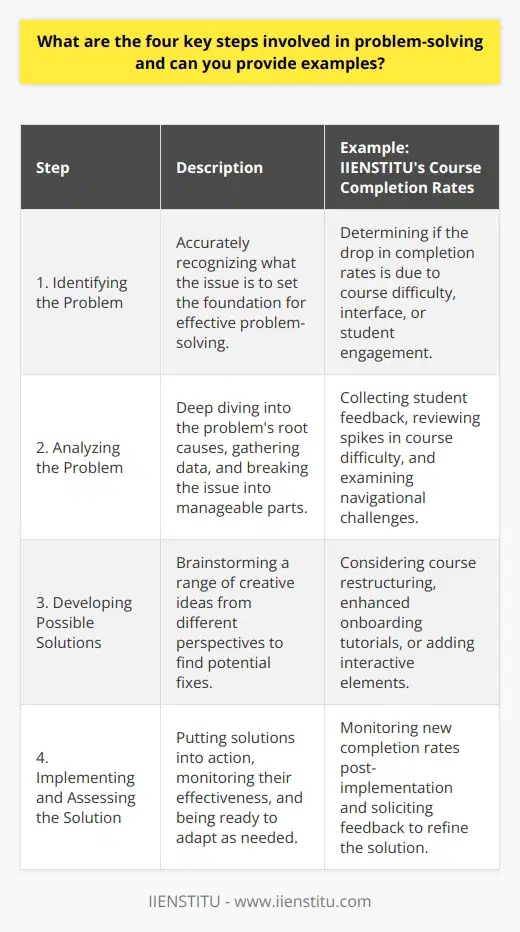
What are the three key components of problem-solving skills?
**Identification of the Problem**
The first key component of problem-solving skills is the identification of the problem. This involves accurately recognizing and defining the issue at hand, understanding its context, and considering its impact on various aspects of the situation. Accurate problem identification is crucial for developing appropriate solutions, as it enables individuals to clarify the objectives and goals of the problem-solving process.
**Generation of Alternative Solutions**
Once the problem has been identified, the second key component of problem-solving skills comes into play: the generation of alternative solutions. This stage requires creative thinking and the exploration of multiple possible approaches to address the identified problem. By considering various possibilities, individuals can weigh the potential benefits and drawbacks of each option and determine the most suitable solution for the specific circumstances.
**Evaluation and Selection of the Optimal Solution**
The final key component of problem-solving skills is the evaluation and selection of the optimal solution. During this stage, individuals assess the feasibility and effectiveness of each alternative solution generated previously, considering factors such as resource constraints, short- and long-term implications, and alignment with the overall objectives of the problem-solving process. Once the most suitable option is identified, it can then be implemented and monitored, allowing for adjustments if necessary to ensure successful resolution of the problem.
In conclusion, effective problem-solving skills involve three key components: identification of the problem, generation of alternative solutions, and evaluation and selection of the optimal solution. By engaging in these stages systematically, individuals can develop the ability to address a wide array of challenges and navigate complex situations successfully.
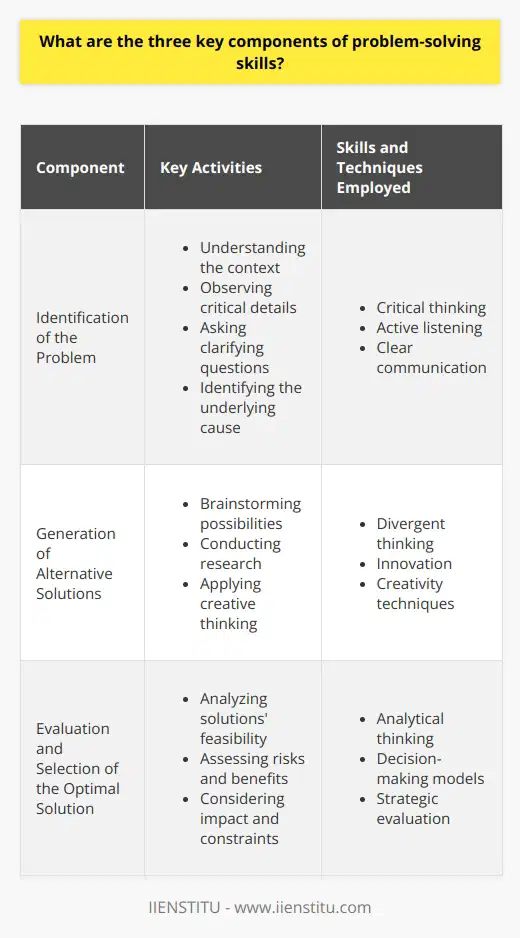
What are the 5 steps in problem-solving?
**Identifying the Problem**
The first crucial step in problem-solving is identifying the problem itself. This requires recognizing the issue at hand and defining it clearly in order to gain a comprehensive understanding of its nature and scope.
**Generating Possible Solutions**
Once the problem has been identified, the next step involves generating a range of possible solutions. This typically includes brainstorming different ideas and approaches that could potentially address the issue, allowing for diverse perspectives and creative thinking.
**Evaluating the Solutions**
After formulating the possible solutions, it is essential to evaluate each one based on its feasibility, potential effectiveness, and any associated costs or risks. This assessment should be conducted objectively and, if possible, with input from multiple stakeholders to ensure a thorough evaluation.
**Selecting the Best Solution**
With the potential solutions evaluated, the next step is selecting the most appropriate one to be implemented. This decision should be founded on the previously conducted evaluation, taking into account the effectiveness, feasibility, and any potential drawbacks of each option.
**Implementing and Monitoring the Solution**
The final step in problem-solving is putting the selected solution into action and closely monitoring its progress. This involves tracking the outcomes produced and identifying any necessary adjustments or revisions that need to be made to optimize effectiveness. Regular assessments of the solution's performance also serve to inform future problem-solving endeavors.
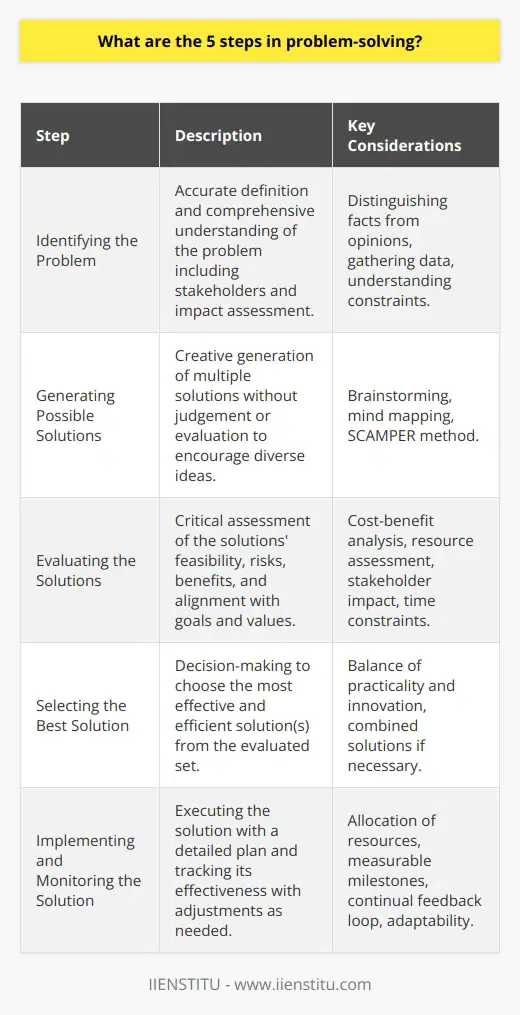
How does the process of problem-solving differ across various disciplines and industries?
Understanding Problem-Solving Differences across Disciplines
Problem-solving is a crucial skill employed in various industries and disciplines. However, the approaches adopted to tackle issues can vary significantly, depending on the inherent nature of the field and the problem being addressed. Understanding these differences enable professionals to develop tailored techniques for effectively addressing challenges in their respective fields.
Analytical Approaches in Science and Engineering
In scientific and engineering disciplines, problem-solving often entails adhering to a structured method that involves identifying the problem, understanding the underlying principles, formulating hypotheses, designing experiments or simulations, and validating the results to ensure a solution's accuracy and reliability. This deductive and analytical methodology is grounded in the application of theoretical frameworks, empirical evidence, and mathematical models.
Creative Thinking in Arts and Humanities
In contrast, problem-solving within the arts, humanities, and design-related fields involves creative thinking, embracing ambiguity, and reframing problems to generate innovative and effective solutions. Unlike analytical approaches, the focus of arts and humanities disciplines is on exploration and open-ended inquiry, which involves divergent thinking, imaginative expression, and inductive reasoning. The process takes into consideration subjectivity and differing perspectives, as interpretations may vary.
Decision-Making in Business and Management
In the realm of business and management, problem-solving comprises both analytical and creative approaches. Decision-makers must rely on data-driven analyses, while simultaneously engaging in strategic and creative thinking to navigate complexities and uncertainties inherent in a market economy. The problem-solving process in business and management also emphasizes interpersonal aspects, including negotiation, collaboration, and leadership, to effectively implement solutions and achieve shared goals.
Iterative Processes in Technology and Software Development
Technology and software development industries employ iterative problem-solving methodologies, such as Agile, Scrum, or Lean, which focus on continuous improvement, adaptability, and collaboration. These methodologies prioritize rapid prototyping, user feedback, and iterative refinement, allowing teams to respond to evolving requirements and changing environments proactively. This approach cuts across traditional disciplinary boundaries and fosters interdisciplinary collaboration and innovation.
In conclusion, problem-solving processes differ across various disciplines and industries due to their inherent nature, objectives, and features. Fostering a deep understanding of these differences enables professionals to adapt their problem-solving techniques to suit their respective fields effectively. Thus, the key to successful problem-solving lies in recognizing and incorporating discipline-specific strategies and tools while maintaining the universal principles of critical thinking and effective communication.
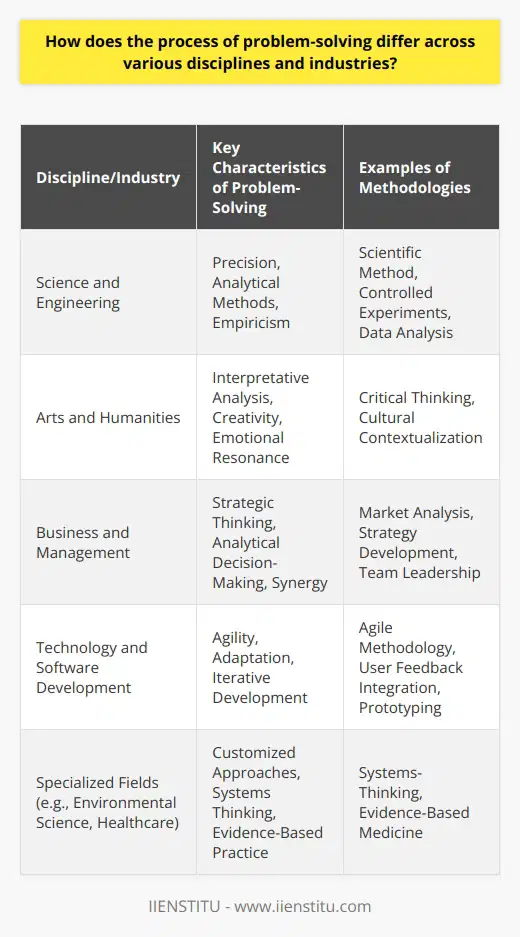
What are the fundamental principles that guide effective problem-solving techniques?
Understanding the Principles
The fundamental principles that guide effective problem-solving techniques can be broadly categorized into the following areas: identification, analysis, development of strategies, implementation, and evaluation. Each of these principles is crucial to ensure that any solution devised addresses the issue comprehensively and leads to favourable outcomes.
Issue Identification
The first principle, issue identification, involves the accurate recognition of the problem at hand. It requires observing the situation closely, collecting pertinent information, and defining the problem clearly. Without proper understanding and delineation of the problem, deriving an effective solution becomes challenging.
Problem Analysis
Once the problem has been identified, the next step is problem analysis. This principle entails breaking the problem into smaller, more manageable components and examining each part thoroughly. By understanding the intricacies and interconnections among these components, individuals can gain a clearer perspective on the issue, making it easier to navigate potential solutions.
Strategy Development
The development of strategies is the third principle and focuses on generating and selecting appropriate solution options. This process can be approached through brainstorming, research, or consulting with experts. After conducting a thorough evaluation of possible alternatives, individuals must choose the most effective and feasible method to address the problem.
Solution Implementation
The implementation principle involves acting upon the selected solution. This may require effective communication, collaboration, and resource allocation. It is essential to monitor the progress of the implementation and make adjustments as needed to ensure the desired results. Perseverance and adaptability play significant roles in this phase.
Evaluating Outcomes
Lastly, the evaluation principle entails assessing the effectiveness of the implemented solution. This could involve reviewing the outcomes, measuring the impact, and comparing the results to the initial goal. Evaluation helps determine whether the solution was successful and offers valuable insights that can assist in improving future problem-solving endeavors.
In conclusion, the fundamental principles that guide effective problem-solving techniques revolve around proper identification, thorough analysis, strategy development, implementation, and evaluation. By adhering to these principles, individuals can significantly increase their chances of solving problems efficiently and productively.
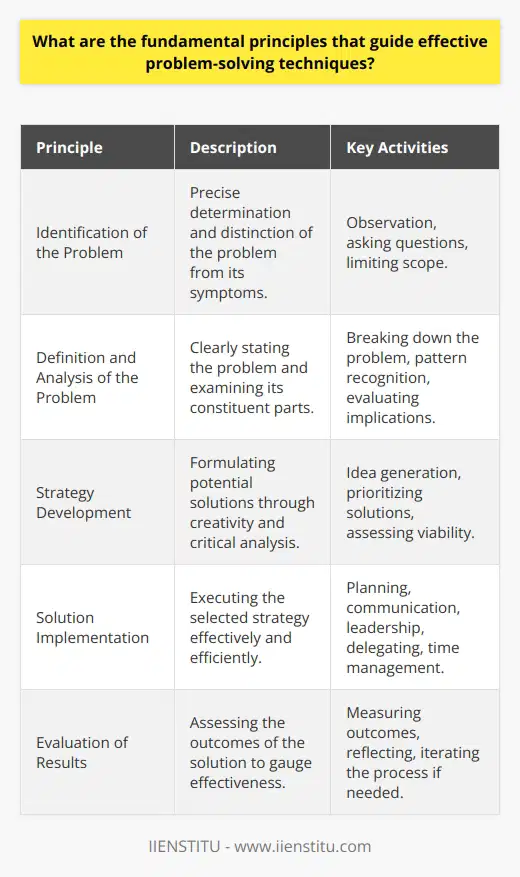
How do societal and cultural contexts influence one's approach to problem-solving?
Societal Context's Influence on Problem-Solving
Societal context plays a significant role in shaping one's problem-solving approach. The rules, norms, and values that prevail in a society influence an individual's thoughts, emotions, and behaviors. These factors dictate not only what problems are recognized and prioritized, but also the manner in which solutions are sought and implemented. Essentially, the environment in which a person grows and functions informs their perception of problems and potential remedies.
Cultural Context's Impact on Problem-Solving
Cultural context, which encompasses language, beliefs, customs, and traditions, is another key determinant of an individual's problem-solving abilities. Culture shapes cognitive processes, including decision-making, reasoning, and problem-solving skills. For example, research has shown that individualist cultures, such as the United States and Western Europe, tend to emphasize analytical and logical approaches to problem-solving. In contrast, collectivist cultures, including those in East Asia, often promote holistic and relationship-oriented perspectives.
Role of Education and Social Structures
Education and social structures within a society also contribute to one's approach to problem-solving. Educational systems impart problem-solving skills and methods, while social structures, such as family, peer groups, and work environments, provide opportunities for individuals to apply these skills. Additionally, the availability and access to resources, as well as prevailing power dynamics within a society, can greatly influence an individual's ability to address and resolve problems. Limited resources and power imbalances may impede effective problem-solving, while abundant resources and equal power distribution can empower individuals to innovate and succeed.
Adapting Problem-Solving Approaches
Given the considerable influence that societal and cultural contexts hold on problem-solving approaches, it is crucial for individuals to recognize and understand these factors when attempting to resolve issues. Through increased awareness and appreciation of diverse perspectives and approaches, individuals can learn to adapt their problem-solving strategies to suit the situation and make more informed decisions. Moreover, by fostering collaboration and learning from others, individuals can enhance their own problem-solving capabilities, ultimately leading to more effective solutions and positive outcomes.
In conclusion, societal and cultural contexts wield substantial impact on one's approach to problem-solving. With greater consciousness of these influences, individuals stand a better chance of successfully navigating complex issues, drawing on a wealth of resources and perspectives from which to generate creative and effective solutions.
, which offers a range of educational resources and programs. As an educational platform, IIENSTITU focuses on fostering critical thinking and practical skills, which illustrates how an institutional role within a societal and cultural context can influence problem-solving positively.Adjusting to varying contexts, then, becomes a vital skill. By being cognizant of environmental, societal, and cultural dimensions, individuals can refine their problem-solving techniques to align with specific conditions and needs, thereby enhancing their effectiveness. Embracing a cross-cultural perspective allows a person to draw from a broader repertoire of strategies, thus enriching their cognitive toolbox and increasing the likelihood of reaching a successful resolution to complex problems.In an increasingly interconnected world, acknowledging and integrating the various societal and cultural contours in problem-solving endeavors is not a mere advantage but a necessity. This nuanced approach ensures that solutions are not only effective but also resonate with the community’s social fabric and cultural identity.](https://img.iienstitu.com/assets/blog/en/unlocking-problem-solving-skills-what-is-involved/faqs/14/images/bfddba8588dfddb5fb9af107e00ec060805819f0.jpeg?v=2025-11-13&width=3840&quality=60&format=webp)
To what extent does collaboration enhance the problem-solving process, and what are the potential challenges associated with group problem-solving?
Collaboration in Problem-Solving
To a significant extent, collaboration enhances the problem-solving process by fostering creativity, sharing knowledge, and promoting synergy among group members. By engaging diverse perspectives, individuals can think critically, maximizing their capacity to innovate and develop new solutions to complex issues. Shared knowledge and resources enable participants to draw from a broader pool of information, enriching the discussion and strengthening decision-making.
Challenges in Group Problem-Solving
However, potential challenges exist in group problem-solving that can impede progress and result in suboptimal outcomes. These challenges can manifest as communication barriers, social loafing, and groupthink. Communication barriers arise when individuals fail to express their ideas effectively or misunderstand the ideas of others. The presence of such barriers hinders the flow of information and creates confusion, limiting the group's ability to reach well-informed decisions.
Social Loafing and Groupthink
Social loafing occurs when members of a group exert less effort than they would when working alone, leaving the responsibility for problem-solving to others. This can result in an imbalance of contribution among group members and lead to reduced effectiveness in reaching a solution. A related challenge is groupthink, which arises when group members strive for consensus at the expense of critical analysis and independent thinking. This psychological phenomenon can lead to suboptimal decisions, as it stifles diverse viewpoints and undermines the constructive elements of collaboration.
Effective Collaboration
To capitalize on the advantages of collaboration while mitigating potential challenges, it is essential to establish an environment that promotes effective communication and personal accountability. Encouraging open discussion, valuing diversity of thought, and assigning specific roles and responsibilities can significantly improve the group problem-solving process. Moreover, fostering a culture of critical thinking and healthy debate can prevent the detrimental effects of groupthink, ensuring that collaborative efforts yield well-informed and innovative solutions.
In conclusion, collaboration possesses the potential to significantly enhance the problem-solving process. However, attention must be given to the potential challenges, such as communication barriers, social loafing, and groupthink. Addressing these challenges through effective communication and the promotion of individual accountability can maximize the benefits of collaboration in problem-solving, paving the way for innovative and well-informed solutions.
